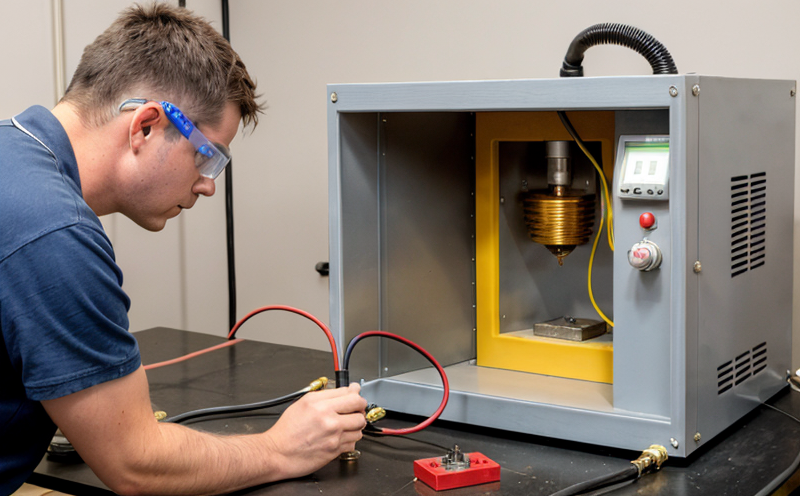ASTM B193 Conductivity of Titanium Alloys
The ASTM B193 standard is a cornerstone in the metallurgical and material testing industry, specifically designed to measure the electrical conductivity of titanium alloys. This test is critical for quality assurance in sectors such as aerospace, automotive, and medical devices where the properties of materials directly impact product performance and safety.
Titanium and its alloys are known for their exceptional strength-to-weight ratio, corrosion resistance, and biocompatibility, making them indispensable in numerous industries. However, these qualities can vary significantly depending on alloy composition and processing methods. The ASTM B193 test provides a reliable way to quantify the electrical conductivity of titanium alloys, ensuring consistent quality across production batches.
The testing process involves preparing samples according to strict specifications detailed in the standard. These samples are then subjected to a series of tests using specialized equipment that measures their electrical resistance over a defined current path. The results provide a direct measure of how efficiently the material conducts electricity at room temperature, which is crucial for applications requiring precise control over conductivity.
Understanding the electrical properties of titanium alloys is essential not only for ensuring product reliability but also for optimizing manufacturing processes and improving overall efficiency. By adhering to ASTM B193, manufacturers can ensure their products meet stringent quality standards, thereby enhancing customer satisfaction and fostering trust in the market.
This standard plays a pivotal role in various industries by providing consistent data that can be used to compare different batches of titanium alloys or to monitor changes in material properties over time. The results from ASTM B193 testing are often used as part of broader quality management systems, helping companies maintain compliance with industry regulations and customer expectations.
Moreover, the test's precision allows for early detection of any deviations from expected conductivity levels, which can be indicative of changes in alloy composition or processing conditions. This capability is particularly valuable in high-stakes environments where even minor variations could have significant consequences.
In summary, ASTM B193 provides a robust framework for evaluating the electrical conductivity of titanium alloys, supporting industries that rely on these materials for critical applications. By leveraging this standard, manufacturers can ensure consistent product quality and stay ahead in competitive markets.
Applied Standards
The ASTM B193 test is part of a broader suite of standards used to evaluate the physical properties of metals. These include tensile strength (ASTM E8/E8M), hardness testing (ASTM E10), and corrosion resistance assessments (ASTM G48). Together, these tests provide comprehensive insights into the mechanical and chemical behavior of materials.
- Tensile Strength: Measures how much stress a material can withstand before breaking. This is crucial for understanding a material's ability to resist deformation under load.
- Hardness Testing: Determines a material's resistance to indentation, which is important for assessing its wear resistance and potential lifespan in various applications.
- Corrosion Resistance: Evaluates the susceptibility of materials to degradation by environmental factors like moisture or chemicals. This is vital for ensuring longevity in corrosive environments.
When combined with ASTM B193, these tests offer a holistic view of a titanium alloy's performance characteristics. This comprehensive approach ensures that manufacturers can make informed decisions about material selection and process optimization, ultimately leading to higher quality products.
Quality and Reliability Assurance
Ensuring the quality and reliability of materials is paramount in industries where product integrity directly impacts safety and performance. ASTM B193 plays a critical role in this regard by providing a standardized method for evaluating the electrical conductivity of titanium alloys.
The test process begins with precise sample preparation, ensuring that each specimen is representative of the batch it comes from. This attention to detail is essential because even small variations in sample preparation can lead to inaccurate results, compromising the integrity of the testing process.
Once prepared, the samples undergo rigorous testing using sophisticated equipment designed specifically for this purpose. The test setup includes a current source and measuring instruments capable of detecting minute changes in electrical resistance. These measurements are then analyzed to determine the conductivity value according to ASTM B193 specifications.
The results from these tests are typically documented meticulously, providing a clear record of each batch's performance. This documentation is invaluable for quality control purposes, allowing manufacturers to track trends over time and identify any potential issues early on. It also facilitates easier traceability in case of recalls or other quality-related concerns.
By incorporating ASTM B193 into their quality assurance protocols, companies demonstrate their commitment to maintaining high standards of product integrity. This not only enhances customer trust but also fosters long-term relationships by ensuring consistent delivery of reliable products.
Frequently Asked Questions
Competitive Advantage and Market Impact
The use of ASTM B193 offers significant competitive advantages in several ways:
- Consistency in Quality: Ensures that each batch of titanium alloy meets the same high standards, leading to consistent product quality.
- Precision and Reliability: Provides accurate data that can be relied upon for making informed decisions about material selection and process optimization.
- Compliance with Regulations: Helps manufacturers comply with industry regulations and customer expectations, ensuring they stay ahead of the competition.
- Enhanced Reputation: Demonstrates a commitment to quality and reliability, enhancing the company's reputation in the market and fostering long-term relationships.
The ability to consistently deliver high-quality products is crucial for maintaining a strong market position. ASTM B193 supports this goal by providing a robust framework for evaluating titanium alloy conductivity, ensuring that manufacturers can meet stringent quality standards and customer expectations.





